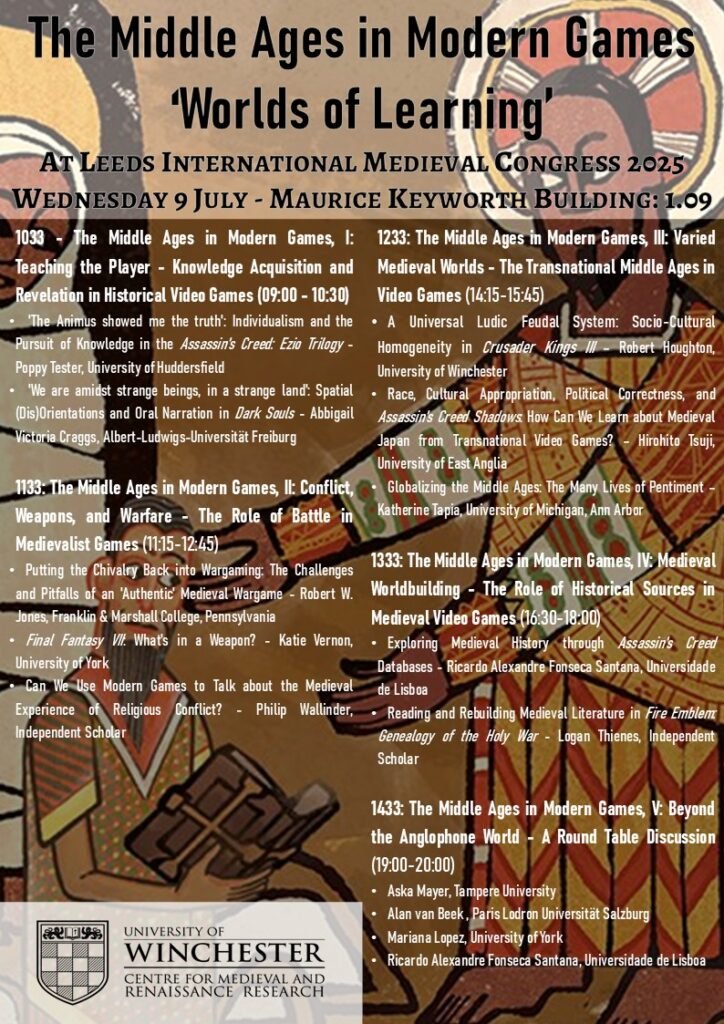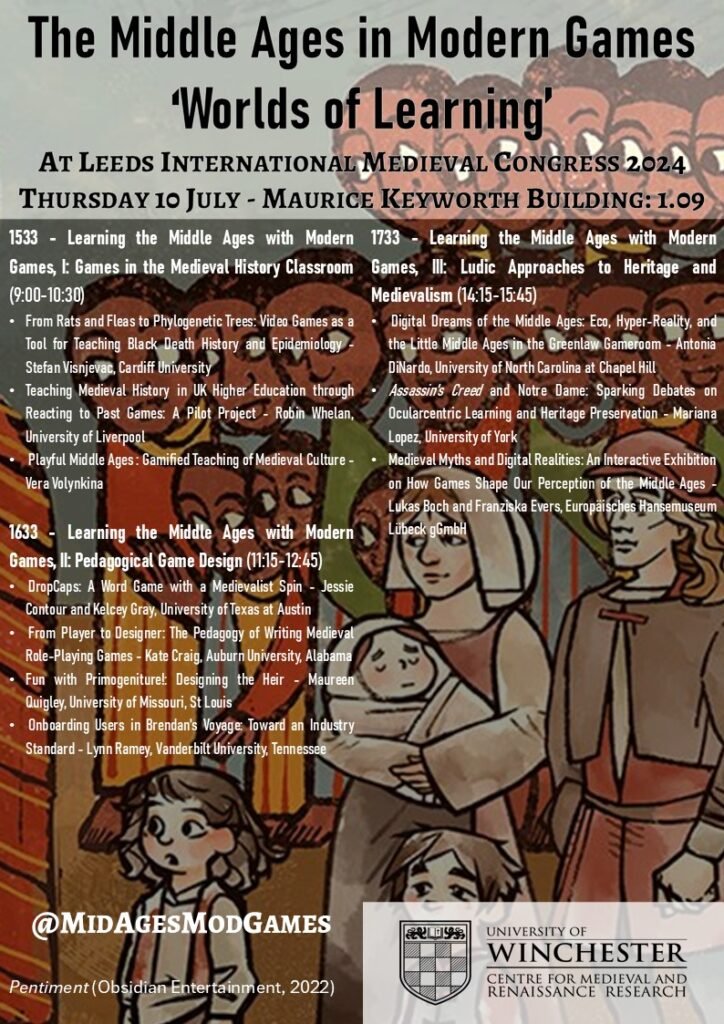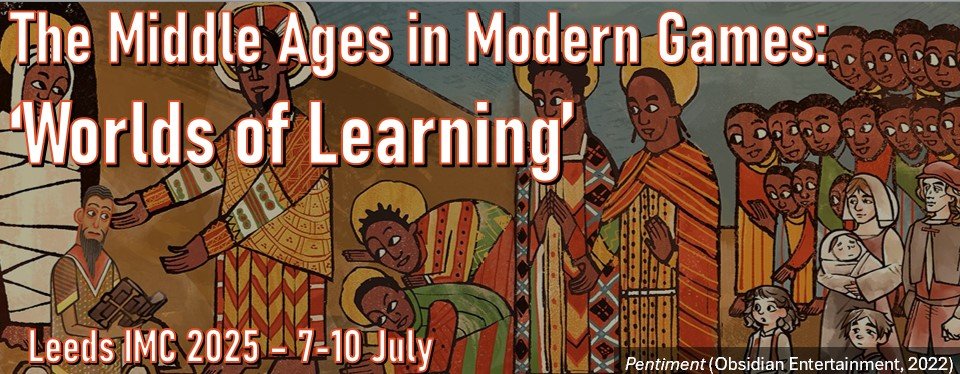We’re delighted to be returning to the International Medieval Congress at the University of Leeds next week. We’ve got 20 papers in person and online spread over two days of the event, alongside a roundtable looking at perspectives on medievalist games outside the Anglophone world. If you’re attending the event, come and find us in room 1.09 of the Maurice Keyworth Building on 9 and 10 July.
This will be our fourth appearance at the Leeds IMC. Take a look at the programmes from our previous strands.
Full programme for 2025 below.


Wednesday 9 July
1033 – The Middle Ages in Modern Games, I: Teaching the Player – Knowledge Acquisition and Revelation in Historical Video Games (09:00 – 10:30)
• ‘The Animus showed me the truth’: Individualism and the Pursuit of Knowledge in the Assassin’s Creed: Ezio Trilogy – Poppy Tester, University of Huddersfield
• ‘We are amidst strange beings, in a strange land’: Spatial (Dis)Orientations and Oral Narration in Dark Souls – Abbigail Victoria Craggs, Albert-Ludwigs-Universität Freiburg
1133: The Middle Ages in Modern Games, II: Conflict, Weapons, and Warfare – The Role of Battle in Medievalist Games (11:15-12:45)
•Putting the Chivalry Back into Wargaming: The Challenges and Pitfalls of an ‘Authentic’ Medieval Wargame – Robert W. Jones, Franklin & Marshall College, Pennsylvania
•Final Fantasy VII: What’s in a Weapon? – Katie Vernon, University of York
•Can We Use Modern Games to Talk about the Medieval Experience of Religious Conflict? – Philip Wallinder, Independent Scholar
1233: The Middle Ages in Modern Games, III: Varied Medieval Worlds – The Transnational Middle Ages in Video Games (14:15-15:45)
•A Universal Ludic Feudal System: Socio-Cultural Homogeneity in Crusader Kings III – Robert Houghton, University of Winchester
•Race, Cultural Appropriation, Political Correctness, and Assassin’s Creed Shadows: How Can We Learn about Medieval Japan from Transnational Video Games? – Hirohito Tsuji, University of East Anglia
•Globalizing the Middle Ages: The Many Lives of Pentiment – Katherine Tapia, University of Michigan, Ann Arbor
1333: The Middle Ages in Modern Games, IV: Medieval Worldbuilding – The Role of Historical Sources in Medieval Video Games (16:30-18:00)
•Exploring Medieval History through Assassin’s Creed Databases – Ricardo Alexandre Fonseca Santana, Universidade de Lisboa
•Reading and Rebuilding Medieval Literature in Fire Emblem: Genealogy of the Holy War – Logan Thienes, Independent Scholar
1433: The Middle Ages in Modern Games, V: Beyond the Anglophone World – A Round Table Discussion (19:00-20:00)
•Aska Mayer, Tampere University
•Alan van Beek , Paris Lodron Universität Salzburg
•Mariana Lopez, University of York
•Ricardo Alexandre Fonseca Santana, Universidade de Lisboa
Thursday 10 July
1533 – Learning the Middle Ages with Modern Games, I: Games in the Medieval History Classroom (9:00-10:30)
•From Rats and Fleas to Phylogenetic Trees: Video Games as a Tool for Teaching Black Death History and Epidemiology – Stefan Visnjevac, Cardiff University
•Teaching Medieval History in UK Higher Education through Reacting to Past Games: A Pilot Project – Robin Whelan, University of Liverpool
• Playful Middle Ages : Gamified Teaching of Medieval Culture – Vera Volynkina
1633 – Learning the Middle Ages with Modern Games, II: Pedagogical Game Design (11:15-12:45)
• DropCaps: A Word Game with a Medievalist Spin – Jessie Contour and Kelcey Gray, University of Texas at Austin
• From Player to Designer: The Pedagogy of Writing Medieval Role-Playing Games – Kate Craig, Auburn University, Alabama
•Fun with Primogeniture!: Designing the Heir – Maureen Quigley, University of Missouri, St Louis
• Onboarding Users in Brendan’s Voyage: Toward an Industry Standard – Lynn Ramey, Vanderbilt University, Tennessee
1733 – Learning the Middle Ages with Modern Games, III: Ludic Approaches to Heritage and Medievalism (14:15-15:45)
• Digital Dreams of the Middle Ages: Eco, Hyper-Reality, and the Little Middle Ages in the Greenlaw Gameroom – Antonia DiNardo, University of North Carolina at Chapel Hill
•Assassin’s Creed and Notre Dame: Sparking Debates on Ocularcentric Learning and Heritage Preservation – Mariana Lopez, University of York
•Medieval Myths and Digital Realities: An Interactive Exhibition on How Games Shape Our Perception of the Middle Ages – Lukas Boch and Franziska Evers, Europäisches Hansemuseum Lübeck gGmbH
